Table of Contents
If you’ve ever been to a law lecture, it’s likely you have felt a bit overwhelmed by the content or simply lost track of what the lecturer is saying. Unfortunately, law lecturers are all too keen to explain concepts as if we are already lawyers. But, it gets worse. While you were scribbling down the notes from one slide, the lecturer is already 5 slides ahead, and you have no hope of catching up with what they are talking about. No doubt you ask yourself why you didn’t just stay in bed…
Luckily, there are some tried and tested tips for making the most out of your law lectures. By the end of this article I am going to demonstrate the techniques that first class law students use to stay on top of the lectures and use them as a springboard for further learning.
✍️ What Should You Take Notes On?
Most law students approach their lectures as if they are court stenographer, eagerly tapping away at their keyboards to get every single piece of information written down. If you are doing this, you’re already setting yourself up for failure. Seriously. It’s just not possible to keep up with the flow of conversation, and you will be so concentrated on getting the information down you want actually take in anything that is said. You will leave the lecture with a long, unhelpful, set of notes, which you can barely comprehend, let alone learn from.
So, what should you be taking notes of in your law lectures?
If you can find the information in your law textbooks, please don’t take notes on it. Your textbooks, or Digestible Notes, will give you far clearer information than your lecturer will likely manage in their 60 minute monologue. The only time you should be making notes of things that are in your textbook is when the concept is particularly tricky to grasp. That way, your note taking attention is on knowledge that is genuinely useful when it comes to revising rather than the basic topic outlines. Doing this will allow you to build up a database of knowledge that could become a life-saver come exam time.
Lecturers also love to drop hints, especially about ‘important’ topics. You don’t want to be so focused on what they were saying 2 slides ago that you miss some crucial exam information. Typically, the law lecturers will say something along the lines of “this is worth taking note of” or “this is an exam favourite”, to direct your attention to specific pieces of knowledge that are more likely to come up on the day of your exam. At the end of the day, the lecturer will be writing your exam and your performance will be a reflection of their quality of teaching, so providing you with this additional information is in their best interest too.
Finally, focus on summarising information as you listen, which introduces me to the concept of ‘capturing content’.
🎣 Capturing Content
At most schools and universities you can now get a copy of the lecture slides before attending the lesson or lecture. This means there is a very little point copying all the content as it is taught to you.
Instead, you want to use a process of capturing content, which entails taking a screen-shot of the most critical slides and writing a one or two sentence summary of the slide’s content. When it comes to the exam you are going to find it difficult to condense the information if you try and copy everything down, so capturing content allows you to quickly understand the lecture when you return to it at a later date. Additionally, you save yourself the pain of having to rifle through all your notes afterwards in a time consuming process of finding the key points the lecturer made.
For example, let’s say we had the following slide, which talks about the two aspects of the public benefit requirement in the Charities Act 2011:
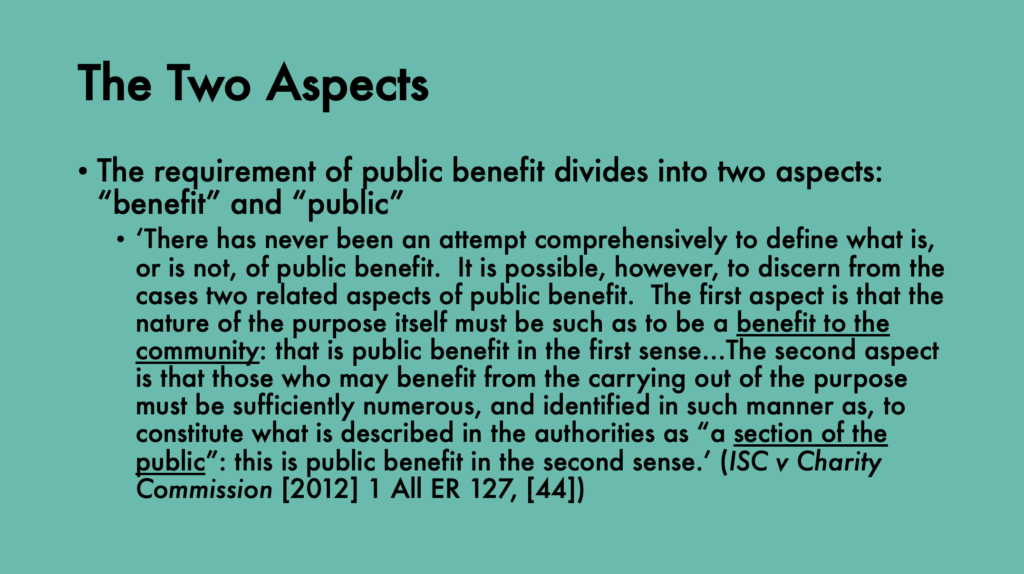
The typical student would be desperately trying to write down everything on the slide, understand the case facts of ISC v Charity Commission, and comprehend the useless tangent the lecturer seems to be taking. The much better approach is to condense this entire slide and everything the lecturer says into: “The public benefit aspect that apply to purposes in the CA 2011 have two distinct aspects that must be explored – ‘public’ and ‘benefit’ (see dicta of ISC v Charity Commission 2012)”
That’s it. You’re not going to actually remember that quotation in your exam, so why bother writing it all down? Write your notes with your exam in mind: is this going to be useful in your exam? Will you remember it in your exam? Is this going to get me extra marks or will I waste time trying to learn it?
Always have an exam-first approach to your law lecture notes.
📄 Where to Take Notes
Great law lecture notes, require a great process.
This is where I would highly recommend Notion, which is a workspace that allow you to logically structure your notes and ideas all in one place, using databases, kanban boards, lists, etc.
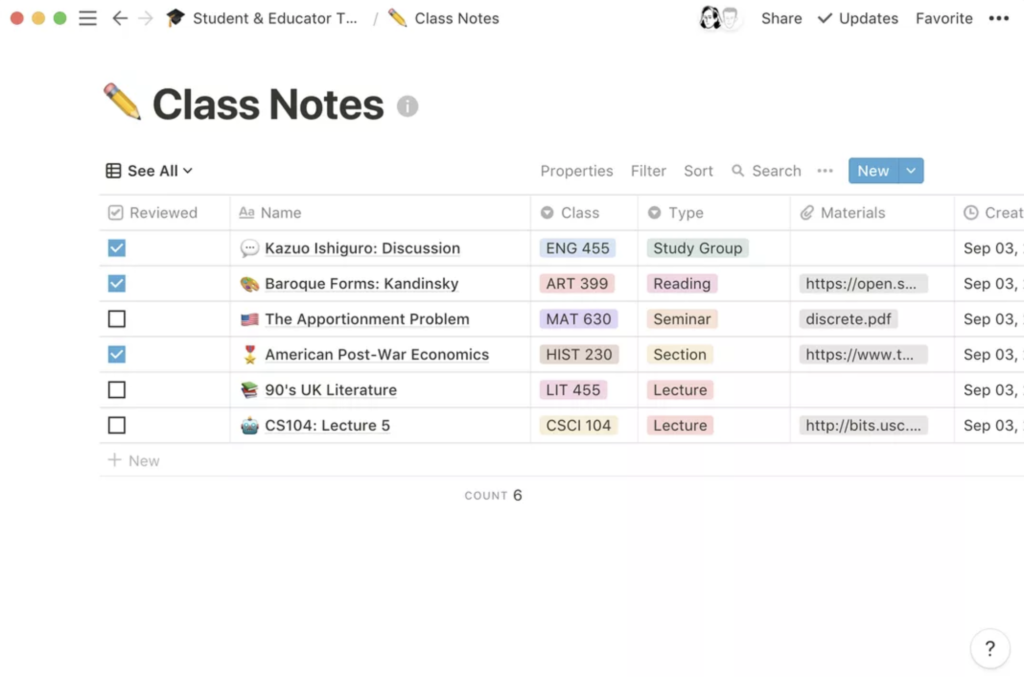
For instance, I create all my notes for Digestible Notes in Notion by splitting each topic (criminal law, constitutional law, contract law, etc.) into separate pages. I can then split these pages into separate sub-topics. For instance, I can split criminal law into sub-topics such as Actus Reus, Mens Rea, Theft, Sexual Offences, etc.). In short, you get a perfectly structured database of notes that you can quickly refer to, build connections between overlapping topics, and inject your own thoughts & opinions.
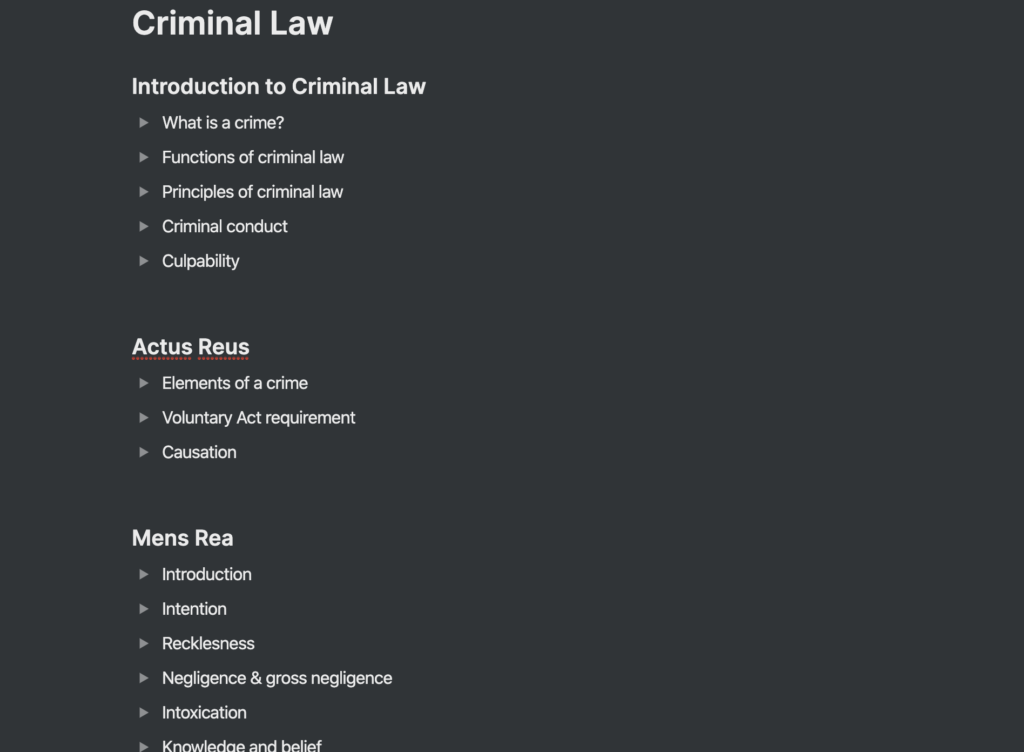
The problem with using something like Word to keep track of your notes or just keeping everything as Powerpoint slides is that you end up with hundreds of standalone, unsorted, documents that have no logical flow to them. Notion really helps you to visualise the structure of your course, see where different areas of law relate to each other, and creates a rapid system of updating notes as your build upon your knowledge.
🤓 Active Recall
Finally, there are two defining steps to making law lecture notes work. The first is the summarising and condensing of critical information, which is discussed above. The second step is to transform the notes so they have an active recall component.
Active recall is the way in which we can move our legal knowledge away from our short term memory (i.e. what we were just taught) into our long-term memory, so we can easily draw on it when we need it most (e.g. in our exams). The way to do this is to transform everything you learn into a question. I explored this idea in a video I made on spaced repetition, but it essentially involves creating flashcards as soon as you can on the course material.
When I first started doing this, I would use something known as the Leitner System (see my explanation of the Leitner system), but now I use the Anki app to do exactly the same thing. Anki allows me to quickly create questions & answers on anything I want and then uses an advanced scheduling algorithm to show me the questions I struggle with most depending on a user-determined difficulty rating. However, I’d highly recommend you only create Anki cards on the questions you think you will struggle with most, up front.
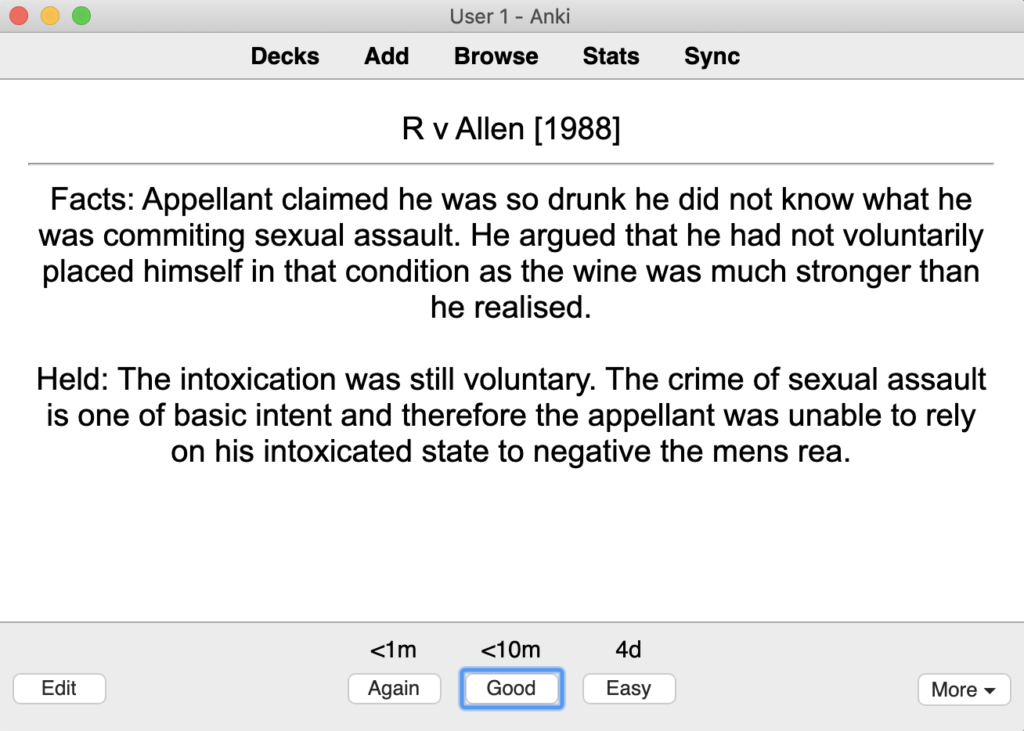
For all other questions and answers, Notion has a nifty toggle feature, which you can use to do a very similar thing. This involves creating a toggle for each questions you have on a particular topic, and then toggling it on/off to show or hide the answer. You can then colour code each toggle as and when you review the answers, depending on whether or not you found it hard or easy to answer. For example, you could make the toggle red if you got the answer wrong, orange if you found it difficult to answer but you got it correct, and green for answers that were simple.
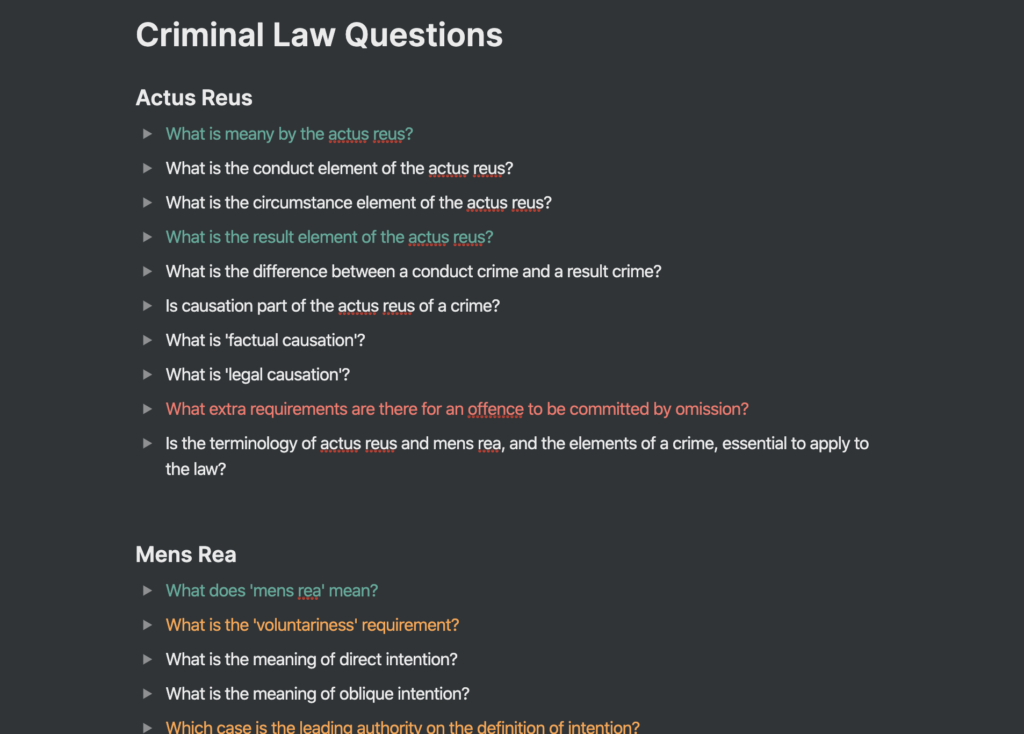
🎉 Conclusion
Writing notes in your law lectures shouldn’t leave you feeling frustrated and lost, which is all too common amongst law students. By focusing on the correct content and having the necessary tools to assist you, you can walk out of the lecture with a solid set of notes as soon as you are finished.
Sure, this isn’t the only way to make notes in law lectures, but it’s a process that I’ve seen work on countless ocassions. So, if you’re feeling a bit lost, why not give it a go and let me know what you think!

